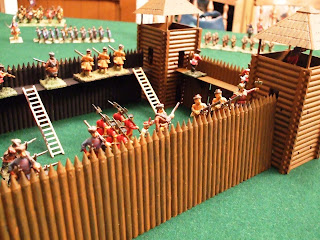The scenario revolved around an isolated fort held by a small garrison and under attack by a besieging force. As the Polish and Cossack figures had not seen action for some time they were used for the play testing. The fort was by Zvezda and it has been on the 'to do' painting list for so long I can't remember where I bought it; however, it was for a project inspired by seeing the Alexander Nevsky film. Needless to say, the figures are still in their boxes.
Provisional Rules
For shooting, defenders operate in pairs, rolling a dice as per snipers to inflict casualties. They will require a '6' to hit and normally this would inflict a morale test on the attackers. Fire from the defenders would be unlikely to stop an attack on its own so two '6's' are required to inflict a test. The attackers can fire, but require at least 11 figures in a unit to have a chance of hitting, (again 6's required). The defenders will have to take a command test, but no immediate negative results apply. Before the action a 'break point' is set based on the quality of the garrison, the leadership etc. Any failed tests build towards this break point and when it is reached the garrison surrenders.
The attackers can use scaling ladders, which the defenders can attempt to dislodge (4-6 required). However, before this step, any supporting musketeers within close range can attempt to keep the defenders' heads down (4-6, with the 6 inflicting a casualty and a test).
Once the ladders are in place the attackers can scale them and melee the defenders at -1. Both sides roll a d6.
The loser by 1 is pushed back; if this is the defender this clears the space at the top of the ladder for another attacker to enter the fort; if it is the attacker then he stays on the ladder.
The loser by 2 is wounded, he is pushed back and fights subsequent rounds of melee at -1.
The loser by 3 is killed.
If the defender wins by 2 or 3, he can attempt to dislodge the ladder before the next round of melee. This can be achieved by rolling a 4-6. If he is successful a second roll is done, a 5 or 6 means the ladder is damaged and cannot be used again. An undamaged ladder can be used to make a further attempt to scale the walls as per rules above.
Although very basic, the rules above gave us two good games. The defence was overcome, but on both occasions the attackers lost a significant number of men. Also the defensive fire did slow the attack of at least one column, preventing an overwhelming co-ordinated attack. In the first game, 3 of the 8 ladders were damaged which hindered the attack. Obviously this element of the rules can be adjusted by varying the number of ladders and/or making them more/less robust.
Here are a few photos of the game.
The gallant Polish defenders
Halberdiers held in reserve
The right wing of the Cossack attack moves forward
The ladders are raised
The end is nigh, the Cossack flags fly inside the fort





Great looking game and figures-Hinchcliffe?
ReplyDeleteThanks very much. Most of the figures are Hichcliffe, but there some Essex in there as well.
ReplyDelete